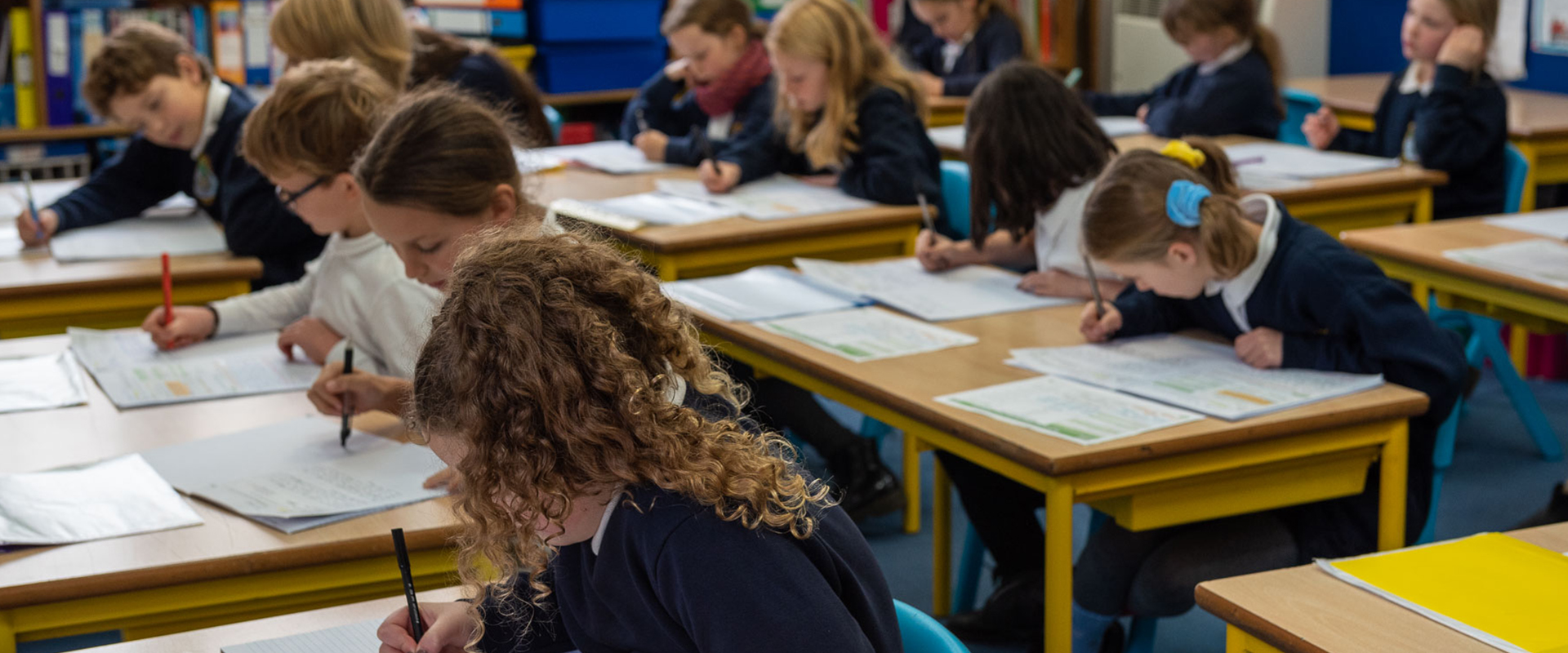
Our English Curriculum
At Boscastle, we are dedicated to delivering an exciting, innovative English curriculum which enables and empowers children to become confident, articulate speakers, inspired writers and avid readers for life.
We aim to create confident and independent writers who:
ü develop stamina for writing throughout their time at school
ü build on a range of skills as they work through each piece of writing
ü write for a range of purposes and audiences
ü are immersed in a range of genres and have a clear understanding of purpose and audience
ü will have a secure understanding of the purpose of a text type and the intended impact of writing skills/tools
ü carefully select vocabulary with careful attention to the desired effect on the readers’ thoughts and feelings
ü are challenged and encouraged to take risks and view mistakes as part of the learning process
ü use the editing process effectively to review and improve their writing
ü set high expectations for themselves, ensuring they take pride in all aspects of learning and in everything they produce
Implementation
English lessons are taught in blocks of writing which take place over roughly 2-3 weeks and are taught through daily lessons. We use a planned process for each block of writing, which can be viewed below; this structured approach to sequences of lessons ensures that the build-up of knowledge and skills is progressive and clear
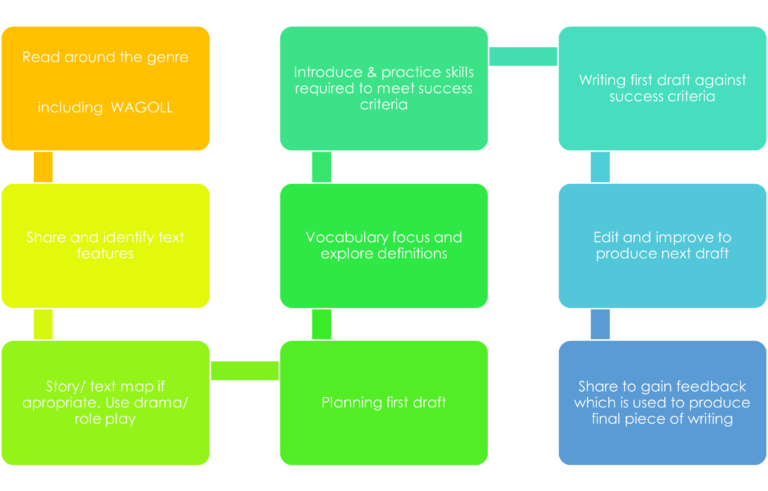
Teachers clearly establish the purposes and audiences for writing at the start of the process of each unit of writing and plan to ensure the learning journey can be made clear and purposeful.
Although the learning process is detailed for each block of writing, teachers have the professional scope to make adjustments where they think they are needed. For example, if more than one lesson is needed to embed a skill then this can be done or if an extra lesson is needed for drama/speaking and listening then teachers have the freedom to do so. There is an expectation that each stage of the learning process takes place and is evident through books, learning environment and planning.
The learning process is shared with the children from the first lesson and this ensures they are fully involved in the process and clear about the outcome they are working towards. In both key stages, children experience writing in different forms for a variety of audiences. They write for different purposes (to entertain, to inform, to discuss and to persuade) and are taught to plan, draft, proof-read, improve and present their writing on paper and on screen, and to discuss and evaluate their own writing and that of others. The links between reading and writing in fiction and non-fiction continue to be made explicit. Children use their knowledge of texts, especially with the Class text they have studied, to construct their own writing and have greater control over organisation, language features, vocabulary and spelling.
Shared writing is integral to our approach to teaching writing children need to see us as writers (and as readers) modelling ‘writing behaviours’ explicitly to them. Therefore, teachers use shared writing on a regular basis to help children to understand how to write a particular kind of text and to provide them with a modelled piece of writing to emulate. It involves the teacher producing a piece of writing with input from the children; teachers should elicit ideas from the children and together they all compose a collaborative passage using the key vocabulary, grammar, spelling and punctuation skills being focussed upon.
New Vocabulary for writing
The teaching of vocabulary is extremely important for all children, and we ensure children recognise a broad range of vocabulary as children move onto Key Stage 3 and into adult life. Children will be introduced to new words which are relevant to the work being produced within each genre of writing, often taken from the class text as well as subject specific vocabulary. Individual word books and vocabulary lists are used to develop children’s vocabulary choices which they can use as a reference. Children will spend time exploring these words with the expectation that they should be able to verbally use them in sentences and within their written work.
The editing process
Editing is viewed as a key part of the writing process which enables children to reflect, re-draft and therefore improve their writing so children are given opportunities for editing and improving writing. The editing process is modelled by the teacher and may be used as a shared writing session for children needing more support, working towards children becoming skilled editors of their writing. Children independently and/or collaboratively read their own writing and reflect on what has gone well and what could be improved on.
Editing will be developed through Editing Stations with a focus on improving vocabulary choices, checking punctuation, grammar and spelling, and including a range of language devices in their writing. Once they have done this, they then improve/add sentences or sections to their work for their final draft. Pupils are encouraged to think about all aspects of their writing that they could improve on, not just skills within a single learning journey. This is so that children focus on what can be improved holistically. The editing process is regularly modelled to children by teachers.
Equal spread of coverage of genres
Genres of writing should be covered with an equal spread so that children have the opportunity to apply skills in a range of writing as well being able to develop technical, structural and vocabulary. The genre overviews ensure there is a clear progression through the school and that children write for a range of purposes, including an emphasis on writing to entertain and engage.
Grammar
Grammar is taught throughout our daily literacy lessons and this is made clear through grammar specific learning objectives where appropriate. As well as this, children are explicitly taught grammar for a 15-minute literacy starter at least twice a week.
Teachers plan sessions based on National Curriculum expectations for each year group. Children are then expected to apply their grammar knowledge throughout each piece of writing.
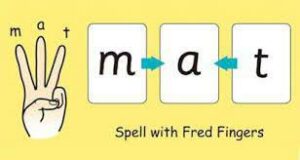
Spelling
In Reception, children are taught the phonemes following Set 1, 2 and 3 sounds in Read, Write Inc. Once they have been taught a sound in class, it is sent home.
Early spelling strategies are taught using Fred talk and Fred fingers to say and count the phonemes (sounds) within a word.
Younger children have red word (words which cannot be decoded) practice books to take home and are expected to practice reading and writing the red words from their Read Write Inc books.
Older children are taught spelling daily in small groups following Read Write Inc spelling. A new spelling rule is taught in each block of learning with systematic sessions using the following structure:
The spellings being learnt by the children are taken from the National curriculum and cover all the spelling conventions, statutory spellings and common exception words that are required to be learnt throughout key stage 1 and 2.
Children have spelling logbooks, which they take home to practice their weekly spellings. Children are encouraged to apply their previously learnt and current spelling rules throughout their writing across the curriculum.
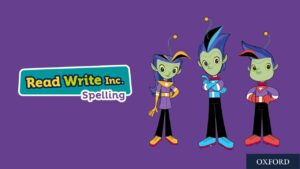
The wider English Curriculum
It is important that children have a purpose and audience for their writing in order to be motivated to write and for writing to be valued. We link much of our writing to subjects across the curriculum, for example, writing explanations in science, information leaflets in history, emails to arrange visits and instructions for DT. Children are directed to writing competitions throughout the year and are encouraged to write for pleasure both at school and at home. We look to share children’s writing termly with their parents and are planning to introduce a school magazine organised by School Council; including children’s independent writing contributions covering a range of genres and following the format of a publication with an editing group. We aim to circulate copies within the community and send copies home to families. In addition, we look for opportunities for children to take part in writing activities out of school; for many years we’ve participated in the St Endellion Book Festival where Year 6 get the chance to meet famous authors and take part in writing workshops for the day. This year, children in Year 5 will be attending a Creative Writing Workshop in the Summer Term.
Impact
The impact on our children is clear: progress, sustained learning and transferrable skills. With the implementation of the writing journey being well established and taught thoroughly from when children first start school and through both Key Stages, children are becoming more confident writers and by the time they are in upper Key Stage 2, most genres of writing are familiar to them and teaching can focus more on creativity, writer’s craft, sustained writing and manipulation of grammar and punctuation skills.
As a result of high-quality teaching and immersion in high quality vocabulary, writing for a purpose and audience, children achieve well and enjoy reading and writing.
Children leave Boscastle with a wide range of vocabulary, a passion for writing and high aspirations to continue to grow and develop their literacy throughout their education.
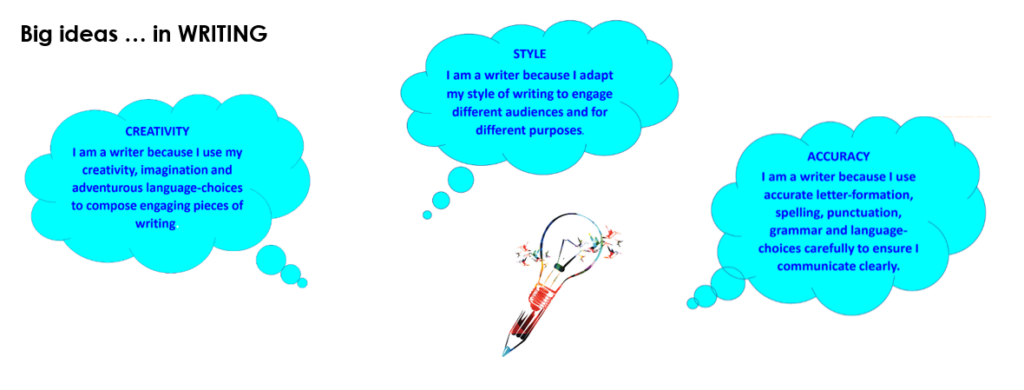
What is writing?
In KS1 I will: | In KS2 I will: |
· Form letters that are evenly sized and numerals correctly · Segment words to spell them and spell some common exception words · Use full stops, capital letters, exclamation marks, question marks, commas in lists and apostrophes · Orally compose sentences and organise sequences of sentences · Write narratives, about real events, poetry and write for a purpose · Use adjectives, subordination (when, if, that, because) and co-ordination (and, but, so, or) · Use past and present tenses correctly · Evaluate, proof-read and check writing makes sense | Use prefixes and suffixes, spell words with ‘silent’ letters, distinguish between homophones, use a dictionary to check spellings of words Write legibly, fluently and with increasing speed Plan writing for an audience, using model texts for reference, researching and noting vocabulary and ideas Draft writing by selecting vocabulary, grammar, describe settings, character and atmosphere, use paragraphs, organise and structure ideas (e.g. with bullet points and headings) Evaluate and edit writing, change vocabulary, grammar and punctuation to improve effect Spell check and proof-read punctuation Use a variety of punctuation |
Handwriting
At Boscastle, we teach children in Early Years to form letters as they are taught the letter sounds, using the Read Write Inc letter formation rhymes.
Once they are forming most letters correctly, children are taught to add anchors and are expected to use joined writing from Year 2. Once children are writing with their letters evenly sized, correctly using ascenders and descenders and joining, they are given a pen pass so they can use a pen for written work
Handwriting is practiced daily in all classes.
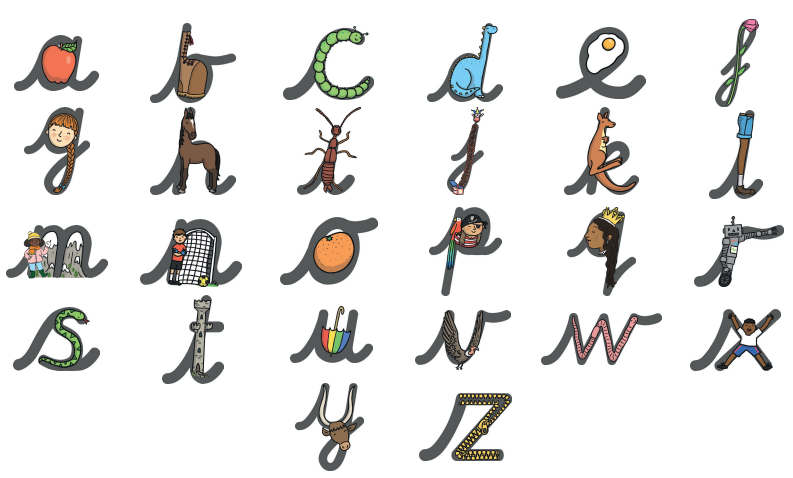
Fore Street
Boscastle
Cornwall
PL35 0AU
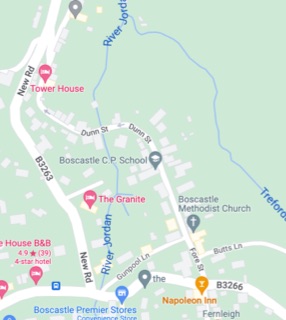
| Cookie | Duration | Description |
|---|---|---|
| cookielawinfo-checkbox-analytics | 11 months | This cookie is set by GDPR Cookie Consent plugin. The cookie is used to store the user consent for the cookies in the category "Analytics". |
| cookielawinfo-checkbox-functional | 11 months | The cookie is set by GDPR cookie consent to record the user consent for the cookies in the category "Functional". |
| cookielawinfo-checkbox-necessary | 11 months | This cookie is set by GDPR Cookie Consent plugin. The cookies is used to store the user consent for the cookies in the category "Necessary". |
| cookielawinfo-checkbox-others | 11 months | This cookie is set by GDPR Cookie Consent plugin. The cookie is used to store the user consent for the cookies in the category "Other. |
| cookielawinfo-checkbox-performance | 11 months | This cookie is set by GDPR Cookie Consent plugin. The cookie is used to store the user consent for the cookies in the category "Performance". |
| viewed_cookie_policy | 11 months | The cookie is set by the GDPR Cookie Consent plugin and is used to store whether or not user has consented to the use of cookies. It does not store any personal data. |